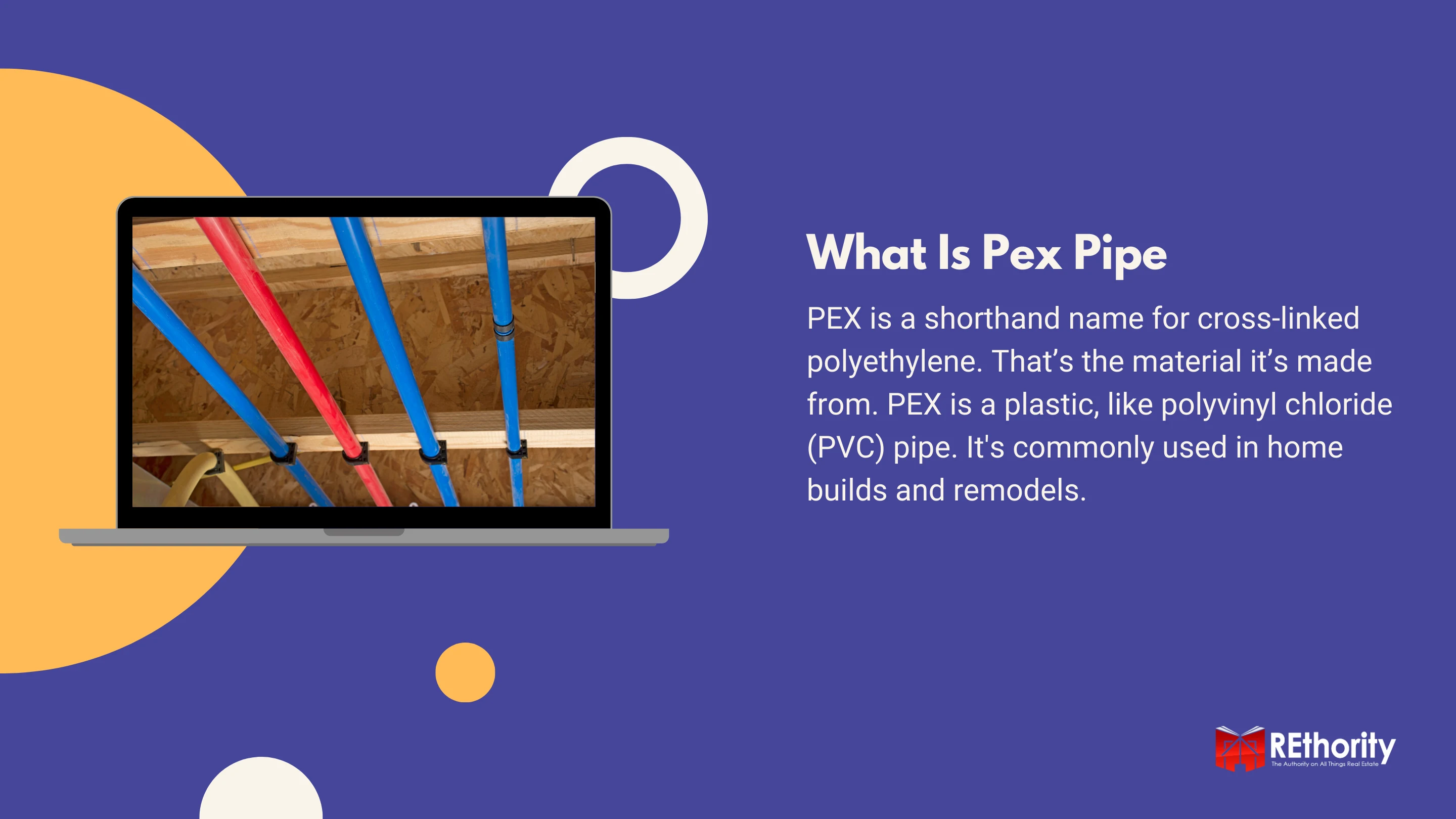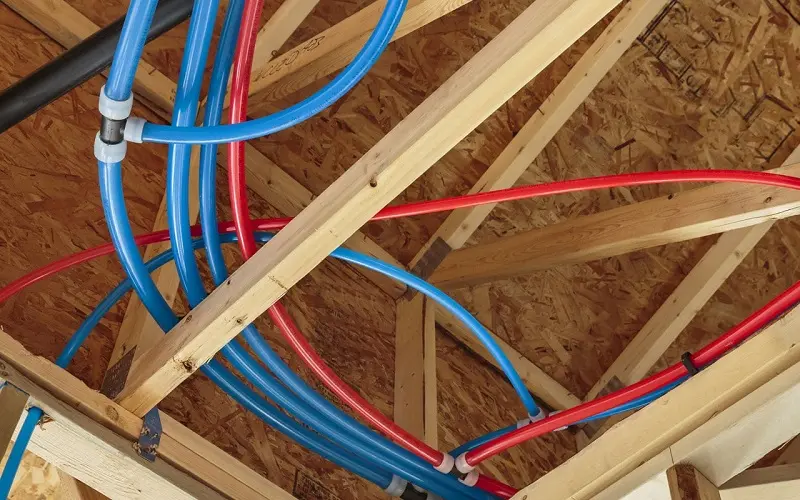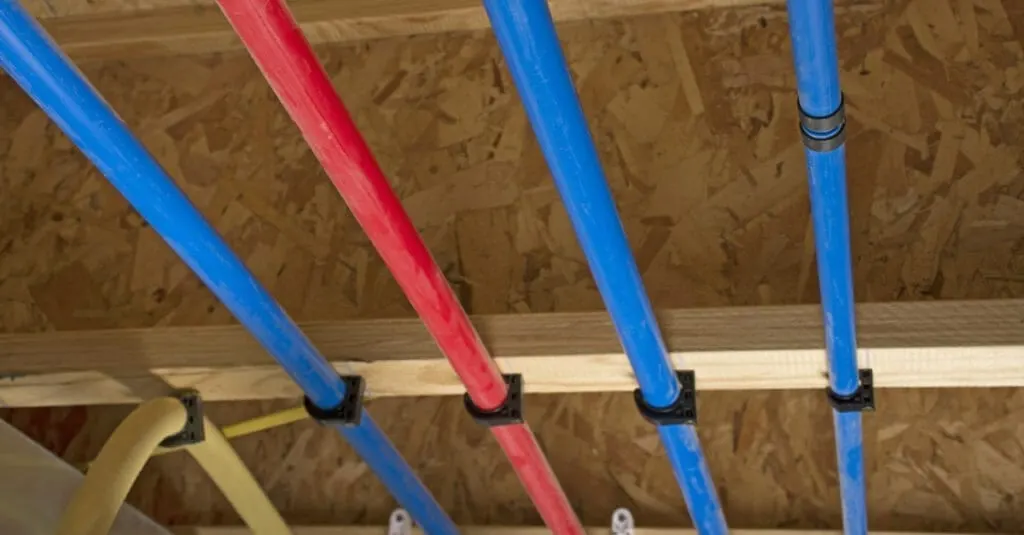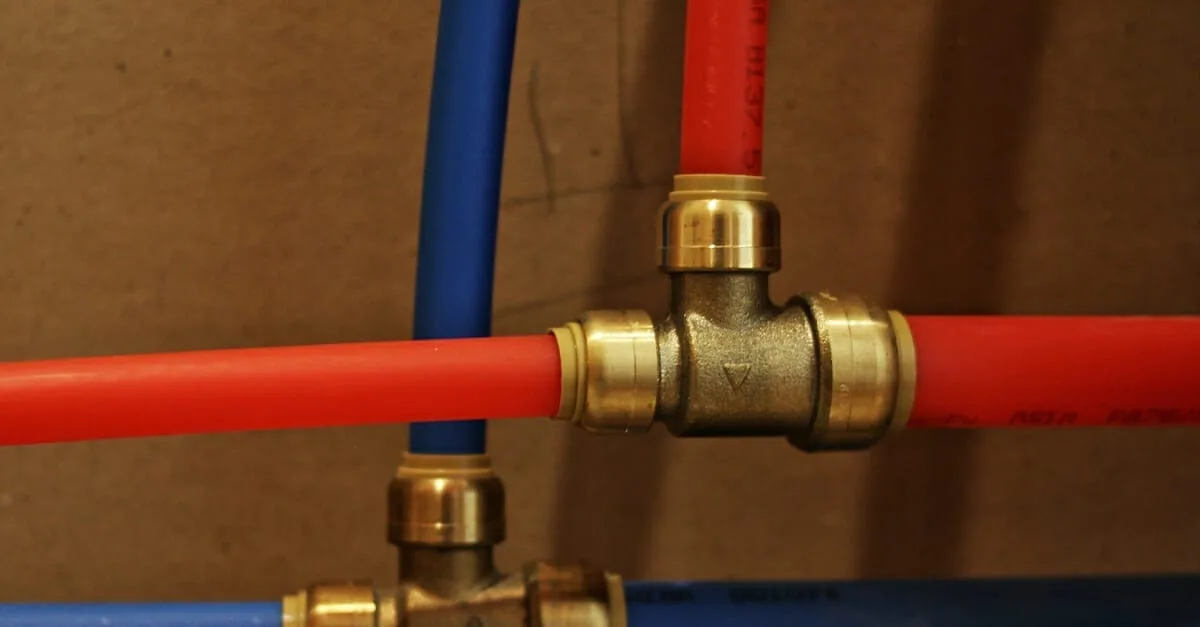PEX is a kind of plastic tubing used for cold and hot water plumbing pipes. PEX has some big advantages over copper and PCV pipe.
As a result, it’s rapidly becoming the standard for new construction, renovation, and repair of drinking water plumbing systems.
What is Pex Pipe?
PEX is a shorthand name for cross-linked polyethylene. That’s the material it’s made from. PEX is a plastic, like polyvinyl chloride (PVC) pipe.
But if you’ve ever worked with PVC pipe, you’ll find PEX lets you get the job done faster and with less mess. In America, PEX has a much shorter history as a water-supply piping material than copper, galvanized steel, and PVC.
But it’s been used for decades in European drinking water systems. It’s also common in radiant floor heating systems in the United States.

Some differences in American water supplies required changing the PEX formula to come up with a pipe that would work stateside.
However, PEX pipes are rapidly replacing the old materials because of their lower cost, easier installation, and superior performance.
Our friends over at Supplyhouse.com do a great job of explaining what this miracle plumbing material is and the difference between various types. Check out their rundown below:
Benefits of Using Pex Pipe
Pex piping has many benefits, ranging from lower installation costs to greater flexibility due to its malleable nature. We’ve highlighted our top benefits below:
Greater Flexibility
It’s more flexible than PVC and doesn’t require glue to connect the water distribution pipes. Compared to copper pipe, PEX piping is more cost-effective. It’s also flexible.
Flexibility means you can complete potable water plumbing projects in less time and with less trouble than with rigid copper or galvanized steel.
You can run a single, unbroken PEX pipe from a central manifold all the way to each individual sink or other fixture. The flexibility of a PEX tube lets it easily twist and turn through walls and floors.

Fewer Joints
This approach to PEX plumbing is called the home-run system. Other plumbing pipes use a main- and branch-line design.
The home-run system doesn’t require nearly as many joints or connections in the water lines. Using the home-run system greatly reduces the time it takes to do an installation.
It also means there is less chance of leaks in the plumbing systems. When you do make connections, you don’t need to solder the PEX fittings as you would with copper.
Easier to Install
That reduces the need for specialized equipment such as torches. It also means less fire risk. In addition to being flexible, PEX piping expands.
That means in the event of a freeze, it’s less likely to crack than copper, steel, or PVC pipe supply lines.
Less Leaks
PEX is also more resistant to leaks than metal pipes. The plastic doesn’t rust or corrode, so there’s less risk of contamination or leakage.
PEX also resists scale buildup. This means there’s less risk of reduced water flow.
Greater Durability
The tubing is highly durable. The minimum life expectancy is 50 years. Some manufacturers state it will last for more than 100 years.
In short, PEX costs less, is easier to install, and lasts longer than competing materials. So it’s easy to see why this tubing is making a splash in plumbing.
Cons of PEX Pipe

David Papazian/Shutterstock
By some estimates, PEX is used in most new home construction today. However, in addition to a lot of advantages compared to the metal and PVC pipe it’s replacing, PEX has some limitations. These include:
Code Restrictions
While PEX is widely used, local building codes may have some restrictions on its use. So it’s best to check your local regulations before opting to go with PEX.
Requires Extra Pipe
Since PEX expands and contracts more than other pipes, it’s important to leave slack when installing it. Use plastic bands instead of metal ties to anchor it. For long runs, install loops to accommodate expansion and contraction.
Brittle in Sun
PEX is sensitive to ultraviolet rays. Left in the sun, it will become brittle and may leak or break. So don’t install PEX outside or where the sun can shine on it. And don’t store it in sunlight for more than 60 days before installing it.
Requires Special Tools
You will also need some special tools for plumbing with PEX. Most of these consist of tools to connect two PEX pipes to the copper, steel, or PVC pipes of an existing installation.
PEX Pipe Colors and Codes

Jason Kolenda/Shutterstock.com
PEX is easy to find at your local home improvement store. Just look for the big rolls of colored plastic piping. PEX comes in four colors.
The different colors are used to help plumbers identify which pipes carry hot and cold water. The colors and what they mean:
- Red PEX is for hot water.
- Blue PEX is for cold water.
- White PEX is for either hot or cold water.
- Gray PEX is for hot or cold water.
PEX tubing of different colors works the same. Any color can be used for either hot or cold water. The colors just help with identification.
PEX Codes
PEX pipe may be made of three different varieties of plastic material. The three types are A, B and C. Here’s what each code means:
- PEX-A: This is the most flexible of the three PEX types. It’s also the most expensive. But the flexibility makes it easier to work with and also more resistant to freeze-cracking.
- PEX-B: Slightly less expensive than PEX-A, PEX-B is also somewhat less flexible. It’s still well-suited for just about any hot- or cold-water plumbing installation.
- PEX-C: This is the stiffest and least expensive variety of PEX. It’s least resistant to freezing. And its stiffness makes it harder to work with. For short runs, however, it’s an economical PEX choice.
Installing Pex Pipe

John Brueske/Shutterstock.com
There are several methods of connecting PEX tubing, including expansion connections, compression fittings, and push-fit fittings. Each requires some special tools:
- Crimping tool: There are several ways to connect PEX pipes. Many do-it-yourselfers and professionals favor the one that uses copper bands or crimp rings. The bands are slipped over the fitting and compressed with a crimping tool.
- Cinch clamp tool: Another method is to slip a cinch clamp over the connection. The stainless steel clamp is then tightened with a special tool.
- Scissor-type cutter: No matter what method of connection you use, it’s important to cut the ends of the PEX pipe cleanly to get a good connection. The best way to do this is with a scissor-like cutter specially intended for cutting PEX.
There are a number of ways to connect PEX pipes to existing pipes. One of the most popular with the DIY crowd is a stab-in fitting.
The existing pipe is cut, and a special stab-in fitting is inserted in the gap. Then the PEX pipe can be pushed into the stab-in fitting. A spring-loaded connector grips the tube for a watertight seal.
Should You Use Pex Pipe?
Pex pipe is a great alternative to copper because it is flexible, cost-effective, and designed to last for decades.
It’s now a standard issue by most code requirements, so if you’re thinking about upgrading your plumbing, PEX piping is the way to go.

